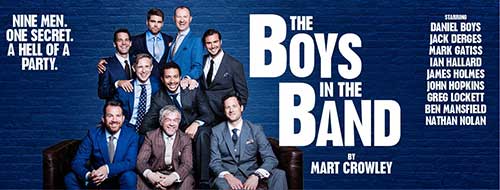It never fails to amaze me and, to a large extent, impress me that certain shows carrying a centrally gay theme or message seem to attract something more than merely an audience which includes, as you might expect, a large proportion of gay people. Indeed that might be expected but I often feel when visiting these shows that there is something more than that. There often seems to be a loyal following and an air of support from such audiences which you wouldn’t get at a production of Hamlet. Those of you familiar with a certain Manchester based fringe company might understand what it is I am waffling on about so hopefully you’ll understand that the same positive atmosphere pervaded last night’s audience of Park Theatre’s national tour of Boys in the Band at Lowry’s Quays Theatre.
I was keen to see this show for the single highly cynical reason that it starred Mark Gatiss who I’ve been a massive fan of since I first ever saw him on TV putting the wrong dog down. It still makes me chuckle. In this he plays the Harold the de-facto leader of a group of friends/enemies/lovers of the New York gay community in 1960s. It’s his birthday and they come together to throw a party at Michael’s apartment. Harold happens to be late and as they prepare for his arrival we’re introduced to a range of homosexual archetypes and stereotypes. In fact he only arrives fashionably late at the very end of act one and laughs. It’s fifteen seconds at best if he doesn’t milk it so I’m not sure he should get paid for act one…

I’m not sure where to start when talking about this play in a more analytic way than going beyond mere synopsis. Sure there are lots of things to talk about but where to start and how to link them is a challenge. Part of the reason is that many certain elements of the play are not linked to certain others.
Set design by Rebecca Brower is perhaps the first thing that really stands out with a steel frame set depicting Michael’s Greenwich Village apartment with its hangings of photos of film stars and posters which when lit make a great opening sequence and although undeniably look pretty, feel a little unnecessary to drive this particular story even if it is a nice effect. The set is functional, simple and aesthetically interesting but unfortunately parts of Jack Weir’s lighting design don’t quite marry in with it completely despite the good ideas and intentions on the part of Weir.
Brower’s set does allow however, the actors to integrate their performances into their surroundings well. It’s slightly unfortunate though those excellent individual performances are not complimented, at least on the face of it, by an integrated ensemble performance. In some ways I think the director Adam Penford may have allowed things to develop this way to demonstrate that these male characters long to be recognised as individuals and secretly desire to be the dominant person within the group. Indeed one of the many strands of the play is the power battle between dominant Harold and Michael played by Ian Hallard.
It’s these strands which are of interest when thinking about the writing. Mart Crowley wrote this play with the intention of lifting a lid on the lives and experiences of gay men and allowing the original mainstream off-Broadway audience that snapshot. One sometimes wonders why, when we already consider our theatrical world to be progressive, do we need to rake over old ground with a revival such as this? The truth is that this is a good story. Beyond that it’s a good set of stories and while the play may have benefited from a few sensitive cuts here and there each character is allowed in turn to tell deeply personal stories. It’s a play which really looks into how the characters experiences have shaped themselves as individuals upto the point of the party. It’s done quite well.
I was concerned that being the slightly introverted straight guy I am, who dislikes hanging out with groups of guys in large numbers that I might find absolutely nothing in common with a play of this nature. I found the power dynamics though fascinating to watch and the politics of an age and time unfamiliar to me was a real hook as they were ever present without ever being dwelled upon. Watching theatre should not be about discussing that which is within our own experiences, which is why this play worked for me.
An afterthought
A niggling thought which has occurred to me when watching this play is that the past two shows’ I’ve seen and reviewed at the Lowry have involved large male only casts and there is a third where men outnumbered women significantly. While both of them are worthy of being produced there must now be recognition within programming departments of receiving venues that this is an issue which needs addressing. It’s getting almost Shakespearean again.
Reviewer: Karl Barnsley
Reviewed: 3rd November 2016
North West End Rating: ★★★★

